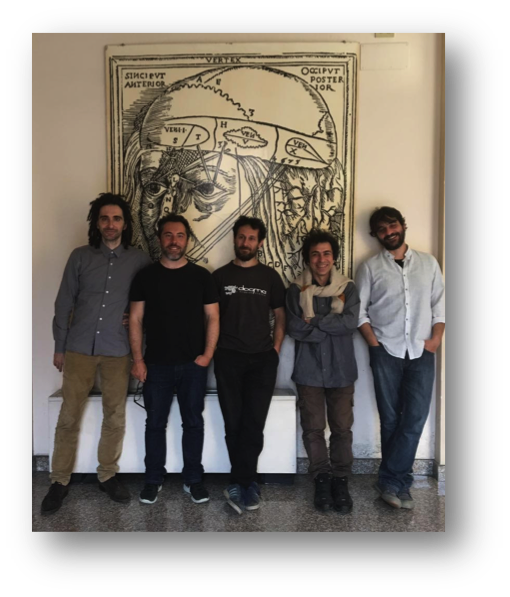
Main research areas:
1. Goal-directed decision-making and planning
We study how humans and other animals make decisions and plan, especially in complex and ecologically valid situations full of action choices. To this aim, we perform experiments on human and animal decision-making and we develop computational models, mainly within the framework of probabilistic (Bayesian) inference.
We developed novel theories of goal-directed choice and planning that emphasize the roles of prediction and internal models (aka model-based control and active inference) and the interplay of decision and action dynamics during situated decisions (aka embodied choice).
Key publications:
- Iodice, P., Ferrante, C., Brunetti, L., Cabib, S., Protasi, F., Walton, M., Pezzulo, G. (2017) Fatigue modulates dopamine availability and promotes flexible choice reversals during decision-making. Scientific Reports 537
- Pezzulo, G., Cisek, P. (2016) Navigating the Affordance Landscape: Feedback Control as a Process Model of Behavior and Cognition. Trends in Cognitive Sciences, 20(6), 414-424
- Stoianov, I., Genovesio, A., Pezzulo, G. (2016) Prefrontal goal-codes emerge as latent states in probabilistic value learning. Journal of Cognitive Neuroscience, 28(1):140-57
- Pezzulo, G., van der Meer, M., Lansink, C., Pennartz, C. (2014) Internally generated sequences in learning and executing goal-directed behavior. Trends in Cognitive Sciences, 18(12), 647-657
We designed the ThinkAhead game to study how we plan in complex environments that defy exhaustive search. You can also use this game to self-evaluate your planning skills, by comparing your scores with the scores of other participants.
You can download the game from the app store (for Android only): https://play.google.com/store/apps/details?id=com.GraphGame.Conan
2. Social interaction and joint action
We study how human co-actors coordinate their actions in space and time to achieve joint goals, such as building something together or performing team sports. To this aim, we perform experiments on human-human joint action and develop computational models.
We developed novel theories of joint action that emphasize mutual prediction and the exchange of coordination signals (aka sensorimotor communication).
Key publications:
- Pezzulo G., Iodice, P., Donnarumma, F., Dindo, H., Knoblich, G. (2017). Avoiding accidents at
the champagne reception: A study of joint lifting and balancing. Psychological Science, in press
- Candidi, M., Curioni, A., Donnarumma, F., Sacheli, L. M., Pezzulo, G. (2015) Interactional
leader-follower sensorimotor communication strategies during repetitive joint actions. Journal of the Royal Society Interface, 12(110), 20150644
-Pezzulo, G., Donnarumma, F., and Dindo, H. (2013) Human sensorimotor communication: A
theory of signaling in online social interactions. PLoS ONE, 8(11):e79876.
3) The grounding of higher cognition in sensorimotor prediction
We study the ways human higher cognitive abilities, and especially future oriented abilities such as prospection and imagination, stem from (and are grounded in) sensorimotor skills. In keeping with embodied theories of cognition, we start from the hypothesis that the architecture of motor prediction and control of our earlier evolutionary ancestors was gradually improved to afford prospective functions and cognitive control – and the latter (higher cognitive) abilities retain essential elements of sensorimotor, predictive control. To test this hypothesis, we perform human experiments and develop computational models.
Key publications:
- Pezzulo, G., Kemere, C., and van der Meer, M. (2017) Internally generated hippocampal sequences as a vantage point to probe future-oriented cognition. Annals of the New York Academy of Sciences, in press.
- Pezzulo, G., Rigoli, F., Friston, K. (2015) Active inference, homeostatic regulation and adaptive behavioural control. Progress in Neurobiology, 134:17–35.
- Lepora, N. F., Pezzulo, G. (2015) Embodied choice: how action influences perceptual decision making. PLoS Computational Biology, 11(4):e1004110, 2015.
4) Probabilistic models of brain and cognition
We develop novel computational models of brain and cognition, usually within the framework of probabilistic (Bayesian) inference and generative models. We proposed novel computational approaches to a variety of cognitive abilities, including perception, decision, planning and learning. In turn, these models offer empirical predictions that we test experimentally.
Key publications:
- Donnarumma, F., Costantini, M., Ambrosini, E., Friston, K., Pezzulo, G. (2017) Action perception as hypothesis testing. Cortex in press
- Friston, K., FitzGerald, T., Rigoli, F., Schwartenbeck, P., O’Doherty, J., Pezzulo, G. (2016)
Active inference and learning. Neuroscience & Biobehavioral Reviews, 68: 862-879.
- Friston, K., FitzGerald, T., Rigoli, F., Schwartenbeck, P., Pezzulo, G. (2016) Active inference:
A process theory. Neural Computation, 29(1): 1-49.

